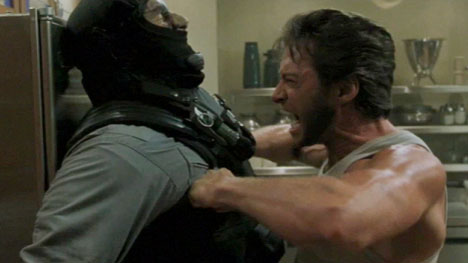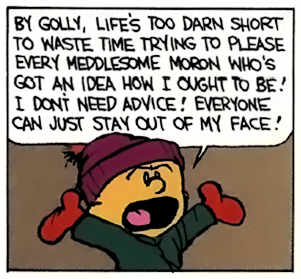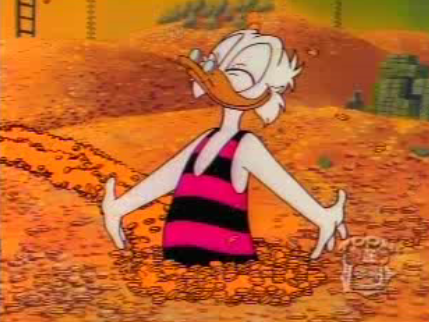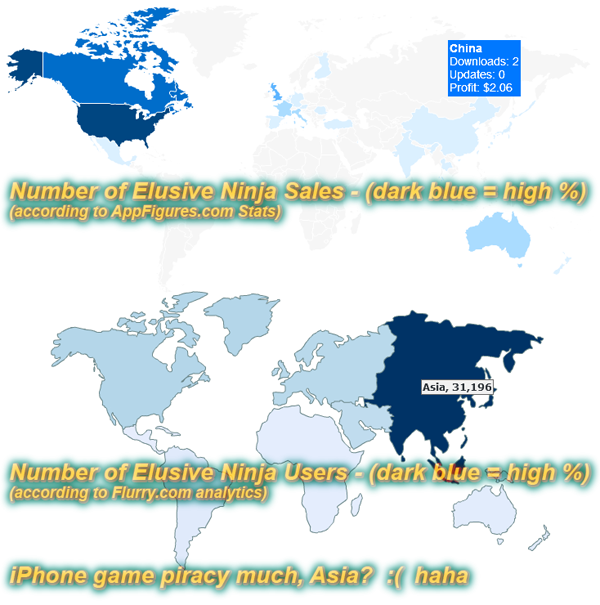
Featured Blog | This community-written post highlights the best of what the game industry has to offer. Read more like it on the Game Developer Blogs or learn how to Submit Your Own Blog Post
Indie Game Marketing: ARTICLE IV – Psychology
Experiments with marketing as a poor Indie Dev! This article covers surviving the internal side of marketing as an Indie Dev and dealing with the stress of spending your money, monitoring sales figures, handling critics, salespeople, and rampant piracy!

INTRO
Hi, my name is Jeff Hangartner! Recently I started a small Indie game studio called Bulletproof Outlaws. I'm an artist working from home and outsourcing the programming, music, etc. I've just finished my first iPhone game – Elusive Ninja: The Shadowy Thief (the App Store link is here). It was officially released on June 6th, 2011. I've jumped into the wonderful world of marketing and I'm approaching it from a bunch of different angles and trying various marketing avenues out. I'm fortunate enough (and planned ahead strategically enough) to have some money to spend experimenting with marketing and I figure by sharing what I've learned, these marketing articles can help other small Indie Developers who can't afford to waste money heading down dead-ends and trying experiments that might not pay off.
There are 5 marketing articles:
Using word-of-mouth marketing via Twitter, blogging, forum threads, etc. to build awareness for your game, and a realistic look at the pros and cons of price drops and using microjob services.
ARTICLE II – Traditional Advertising
An in-depth look into the sketchy side of the industry that people don't seem to talk about like buying downloads, paying for reviews, etc. Also covering traditional expensive marketing like banner ads and marketing agencies and ad services like AdMob.
ARTICLE III – Game Related & Maintenance
What to put in a Press Kit, using Press Releases, creating screenshots and trailers, etc. Plus how to efficiently maintain everything we've talked about so far.
How to survive the internal side of marketing as an Indie Developer and dealing with the stress of spending your money, watching sales figures rise and fall, making big decisions, handling critics and pushy marketers, and a big blunt look at how rampant iPhone App piracy is.
ARTICLE V – Optimal Marketing Plan
A summary of everything, condensed down into 36 steps from Pre-Launch to Launch Day to Post-Launch, that I feel make up an Optimal Marketing Plan for an Indie Dev with little to no money who needs to make sure every dollar spent counts.
ARTICLE IV - Psychology
PSYCHOLOGY
On my Bulletproof Outlaws blog I cover some of the psychology behind game development and behind running your own business from home. Right now I want to talk a bit about the psychology involved in marketing and sales, because I think a lot of people just focus on the numbers and data and there isn't a lot of emphasis put on the mental trials you'll go through. It's kind of like playing poker, there's the actual cards involved and that's important, but there's also a lot of mentalities and outlooks you need to develop to handle the ups and downs in the game.
Ego And Attachment
To paraphrase Fight Club: “You are not your sales. You are not your website hits. You are not your downloads. You are not your reviews. You are not your App Store rank.”
Learn not to attach your self-worth to how your game does. This can be really hard to do, because you spent weeks, months, sometimes years, putting your blood, sweat and tears into your game and you stayed up all night, worked every weekend, and fine-tuned everything in the game to the best of your skills...it's your baby, and you're finally sharing it with the world and hoping to figure out if you can make a living doing your dream job.
Highs and Lows
Your sales do great the first day, and you get a couple 5-Star reviews and you're thinking “I'm awesome, I did it, I'm gonna' be a success!!” and start planning out your next game as visions of dollar-signs dance around in your head. The next day your sales drop down to a fraction of what they started at. And you see a few 1-Star reviews popping up. A big review site reviews your game and says the controls are difficult to learn and the game isn't long enough and gives it 2 out of 5. You reload AppFigures watching in almost real-time as every hour your App Store rank drops. A week later your game is barely selling and you're miserable...you haven't touched designing the next game and you're thinking about how hard it's going to be to go back to having to work a full-time job while only developing games in your spare time.

Awwwwwwwww crap!!!!
When you attach yourself to your stats, your self-worth fluctuates as frequently as your stats do. You'll go through so many emotional rollercoasters on an almost daily basis that it'll be hard to really focus on anything else. You'll start second-guessing your decisions, you'll be less motivated to work on your next game, and just in general you'll do a lot of damage to your psyche that will affect your future as an Indie Game Developer.
On the flip side, even when your game does good there's a risk. You start getting cocky, resting on your heels to enjoy the fruits of your labor instead of jumping into the next project to ensure you have a long-term sustainable income, starting to feel like you can't make a wrong decision so you stop doing as much research and planning and start just winging things, and any down-swing in stats you hit is even more devastating because it's knocking you off a much higher horse than you started out on.
Like the stock market or an epic poker game, your stats will go up and down all the time. If you can keep yourself from freaking out when sales are low, or slacking off when sales are high, you can make rational decisions to handle the situation.
You have to pay attention to your stats, reviews, etc. but don't let them define you as a Game Developer. If you get a bunch of 1-Star reviews, read them and look for commonalities and try to figure out where you went wrong...was it the art style you chose? Was it the controls? Was it the overall game design or theme? Were there massive bugs that crash the game? And how can you fix these things in the future? Would more play-testing have helped? Should you have invested more time or money into an area of development?
Sure, you made some mistakes somewhere, but that doesn't mean you're not cut out to be a Game Developer. Just take it in stride and try to learn from your mistakes for the next time.
My Own Rollercoaster
When I started my Bulletproof Outlaws devBlog out, I was working on marketing it a bit trying to get some exposure to build up a handful of Followers for Elusive Ninja. At one point I got linked on Hackernews and I got like 5,000 hits in an hour. I remember freaking out (in a good way) and being so excited and picturing that being my big break and how it was all going to be so easy from there. I even panicked and called my web provider to see what the prices were to upgrade my site to handle that much traffic. ...one day later, I was back to the usual 20 – 40 hits a day.
I spent a day running around like a chicken with its head cut off haha If that same thing were to happen again today, my first response would be “Awesome, that's a ton of hits...let's see how long it lasts before I get too excited.” It's a lot less emotionally draining to keep a cool head about this stuff.
When I put out Elusive Ninja, I had decent sales the first couple days and then it dropped down from there. Instead of panicking I looked at it like “Okay, this sucks, but why isn't it selling? Hmmm, looking into it it looks like people like it, it just doesn't have any exposure so no one knows it exists. Alright, so this is basically a marketing challenge: How can I get more exposure for my game?” Again, it's a lot less emotionally draining this way.
I still haven't turned things around, but I plan to start my next game and will try cross-promoting Elusive Ninja when I Launch the new game, and I have some Touch Arcade advertising coming up, so I'm still not panicking yet. I'm going to stick to my plan and trust that I'll either be able to turn things around in the future, or I'll learn enough lessons from this game that I'll be more capable of turning my next games into successes.
Some people will say this is just delusional confidence and stubborn optimism, but I think you need a little of both of those things to succeed as an Indie Developer of ANYTHING, whether it's games, music, film-making, writing, etc.
Daily Reports
A lot of times I wish I could get up to the minute stats on my sales from the App Store and think “if I could see them that frequently I could capitalize on sales spikes better!” and that kind of thing. Realistically though, all it'd do is have me checking my stats 24/7 waiting for the numbers to go up and beating myself up when they don't. I like the AppFigures service because it E-Mails me my stats every morning, so I know when I'm thinking about it in the middle of the afternoon that I might as well cut that thread off in my mind entirely because there's literally nothing I can do about it until I get the next day's sales E-Mails. When I started my Bulletproof Outlaws blog I was checking the hits every few hours on my iPhone. Now I check once a week at the most and it's a lot less nerve-wracking.
Dealing With People
Your ego and attachment to your sales will also often affect how you interact with other people. Whether it's how you describe how your game is doing to your friends at a party, or how you respond to a bad review. If your game isn't doing well and it's got you questioning yourself, you start getting annoyed at your friends for asking you about your business and you react a lot more hostile to criticism. When you can separate your self-worth from your sales, you can handle these things in a more positive manner and sometimes find a silver lining in that dark cloud.

Adamantium Rage!!! SNIKTT!!!
It's hard, everyone slips up with it, but it's important to work on this because, especially in this day and age where we're all so connected via the Internet and everyone is Tweeting and friends with eachother on Facebook, the things you say and do stick around forever. In small-team Indie Development especially, people tend to talk about the names behind projects rather than just the projects themselves.
Notch, Jonathan Blow, Adam Atomic, Edmund McMillen...odds are if you're in the Indie scene you know the games these guys are famous for making. Indie Devs tend not to be giant faceless corporations, so you want to try to handle your personal interactions with other Developers, the Press, critics, friends and family, etc. in positive, productive ways. This doesn't mean you have to censor your thoughts or your views, it just means that you should try to remember to present them in a way that doesn't make everyone think you're a dillhole. :)
Building Relationships
Everyone knows it's important to build relationships with the Press, but don't forget about building them with your fans, and even your worst critics. Chat with people on your Twitter, check out the websites of people who are following you, reply when people ask you questions (even hard-hitting questions), build E-Mail lists of people to remember to keep in touch with.
My Own Experiences
When I was starting Elusive Ninja's development, I got an E-Mail from a guy who was planning to move to Calgary and looking for a game design job. I didn't have any money so I couldn't use him, but instead of just ignoring his E-Mail or telling him “Sorry man, not hiring right now!” I sent him back an E-Mail with a list of Calgary game Developers. I know the scene here pretty good, and I've researched that stuff before so I knew where to find websites that list that kind of thing, so I sent them his way and wished him luck. He was super appreciative and it just took a few minutes out of my time to build that little relationship but now there's someone out there in Calgary who would probably be happy to help me out if I needed it down the road because of how I handled things.
When my testers send me feedback about my game, I make sure to respond to their E-Mails point by point and thank them for helping me out. When people Retweet my Tweets I make sure to Tweet a “thanks to @whoever for the RT!” back their way. If someone's looking for a gamedev job on Twitter, I'll RT their Tweet to help their resume get around because I have a lot of gameDevs Following me. I'm still pretty bad at responding to E-Mails in a timely manner, but I DO try to get around to them eventually haha
None of this directly affects the sales of your games, but think of this stuff from a longer-term perspective. As you build a reputation up, you start to carry a little more weight and the projects you make tend to get more attention, both positive and negative. It's infinitely easier to get through tough times when you have a large support base behind you. Plus most people are pretty cool, and making new friends is fun, so don't look at it as a matter of “What can this person do for me?” but more “How can I leave a good impression on this person so they feel good about our interaction?”
Keep In Touch
In our Business course we were told that the most important thing at a business event isn't handing out your business cards, it's collecting other people's business cards. Because the reality is that most people have too much of their own stuff going on to bother contacting you until they see you as a friend or someone who's offering something of value to them. Your Twitter Followers will probably give you a shout here and there because you're offering the value of your game and it's development and behind-the-scenes stuff to them. But a Reviewer on some huge game news site who gets hundreds of E-Mails a day? If you don't make an effort to keep in touch with them, you're probably not going to hear from them again. So shoot them an E-Mail when your next project is going on, remind them who you are, mention that you appreciated their review of your last game and figured they might want a heads-up about your next one, etc.
Value
Relationships tend to work based on value. Whoever's going to receive the most value from the interaction is the one that's going to make an effort to stay in contact with the other person. Once you both have a friendship together, you're mutually giving eachother value so you both keep in touch, but at the start it's often very one-sided especially when it comes to entrepreneurs starting out as nobodies.
Bob knows Joe is a Reviewer for a big gaming news site and Bob is an unknown so he tries to get Joe's attention and tries to keep in touch because Joe reviewing his game would get him a ton of attention and exposure (Bob gets the value). A few years later, Bob runs a top game development company and is putting out it's next multi-million seller hit game that people line up outside of stores for a chance to buy. Now Joe is trying to get in touch with Bob because being able to get an exclusive feature from him would bring his gaming news site a ton of attention and exposure (Joe gets the value).
Ideally you want to form relationships where both sides give eachother value. Bob scratches Joe's back, and Joe scratches Bob's back. So when you're starting out, try to think “How can I give this person value?” instead of “What value can this person give me?” The differences might be as simple as the way you word your E-Mails, or as huge as doing favors or teaming up for cross-promotions.
Dealing With Critics
You're going to get 1-Star reviews and harsh criticisms. This is just going to happen, it doesn't matter how good your game is or how big your reputation is. Somewhere out there are people who aren't going to like what you're doing, and the Internet gives them the ability to express that to everyone in the world, including expressing it directly to you.

Imagine having to listen to THIS guy's judgement of the culmination of your entire life's dreams and ambitions. Could you handle it?
My favorite example from Elusive Ninja is when I put the trailer for it up on GameTrailers. When I got the trailer up on a video site I was like “This is awesome! My trailer is up on one of my favorite news sites!! I’m so happy, I’ve put so much hard work into this, this is the culmination of a lifetime of hopes and dreams and hard work and–” and then a bunch of the first comments are like “Laaaaame.” and “Sucks!” and “Ninjas are so cliche.” and “Yet another iPhone game that’s pretty but has no substance” haha It was a little disheartening to be honest. But at the same time I understand that the Internet in general makes it pretty easy to shoot out gut reactions and using aliases means people tend to be a little harsher than they might be in person, plus on top of it there really ARE a ton of crappy iPhone games out there and people have gotten used to expecting them to not have much more than pretty art so as soon as people see a trailer that has flashes of that it’s like an instant “meh, forget it”.
So I told myself not to stress it too much because even the newest Mario or Metal Gear Solid trailer will have people saying “Looks dumb!”
Then a friend and I were at E3 wandering around the booths and we went into one and I was like “pfft. Sucks.” and then realized there’s probably some dude who set that booth up the night before and stood in front of it, admiring his work, proudly looking over the culmination of his life’s ambitions building a videogame company from scratch and managing to take it all the way to E3 making multi-million dollar games…and then I come along and I’m like “Laaaaame.” and that poor guy is in the back crying that nobody appreciates all his hard work. :)
The lesson here is just to not let criticism get to you. Build a thick skin and don't take criticism of your games as a personal attack.
Kill 'Em With Kindness
I talked about this back in Article III – Game Related & Maintenance, but I want to stress it again because it's important. When you're getting a lot of criticism it can be hard to keep your cool. Try stepping back from the computer and waiting a few hours or a day before responding to anything negative so that you have a chance to cool down a little. Nothing is worse than reacting really badly to someone's negative comments. It lets them know they're getting to you which some trolling types feed off, it makes other people think you're insecure, it keeps you in a foul mood in your personal life, and it extends the back and forth dialogue until you come off like those people who's 30-page argument with “cooldude69” has morphed into a debate about the political policies of 3rd world countries in the YouTube comments section of a “dog pooping on a baby” video.
Also remember that you don't have to respond to EVERYONE. If someone is clearly being negative or trying to goad you into an argument, or just seems adamant in their position that you did something wrong in your game, simply stop responding, gloss over their comment in your response, or respectfully agree to disagree. There's nothing wrong with an “I don't know what to tell you man, if you don't like how my game is looking, that's okay, don't buy it! :)” It's a lot better than perpetuating the negativity.
Decision Making
I covered this in Article II – Traditional Marketing, but just as a refresher: Make sure you have Business Reasons for the decisions you make. It's okay to make wrong decisions, everyone does at some point. But if you had solid, well thought-out reasons for why you made your decision, you won't beat yourself up about it nearly as much as if you just wing your decision making haphazardly.
Trust Yourself
Once you've made a decision, let it go. What's done is done. You did your research, you know the pros and cons, and you've picked which way you're going. Don't stress it, second-guessing yourself all night and worrying about the outcome, there's nothing you can do until you see how it all pans out. Maybe it works out good, maybe it works out bad, but trust that if it works out bad, you'll be able to recover. There are very few situations that are truly impossible to pull yourself out of. Each decision you make and each crisis you survive builds your confidence and these decisions get easier over time.
Everyone Knows Best
You're going to run into a lot of people who give you unsolicited advice on how your game should be designed, how it should look, how you should run your business, who you should hire, how much you should spend on what. Often these are close friends and family members and they honestly have the best of intentions and are trying to help you by offering up their wisdom from their own experiences.

MAN I miss Calvin & Hobbes! I have like all of the collections...best comic strip ever, on so many levels.
But the main rule about this that was drilled into us in our Business Class is to ask yourself “Is this person at LEAST as successful at what I'm doing as I want to be?” If they're not, then take their advice with a grain of salt and think for yourself “Does this make sense to me and jive with my experiences?” It sounds a little cold, but part of being an Indie Developer is learning to weed out what is and isn't useful information. Your dad might be an amazing tool salesman, but that doesn't mean he knows anything about the game industry or running a business. Your best friend might make hobby game projects in his spare time, but that doesn't mean he knows anything about publishing and marketing a game. On the flip side, if a game Developer like Hideo Kojima gives you some advice, listen to it. This doesn't mean other people never have good advice, just learn to sort the good from the uninformed.
Even if you have no intention of following the person's advice, be polite and thank them for their input, then just go ahead and do what you believe is right. :) This comes back to having Business Reasons for your decisions. It's a LOT easier to avoid second-guessing yourself and to weed out well-intentioned but inexperienced advice when you've done the research, calculated the numbers, etc. and you KNOW the reasons you have for choosing Decision A are more solid than the “I just don't think that'll work, dude” your friend who hasn't developed games before is basing Decision B on. He might turn out to be right and you'll have to hear “See? I told you!” but it's easier to laugh about that when you know you made the optimal decision at the time regardless of the outcome.
I am, of course, aware of the irony of writing this section in that Elusive Ninja hasn't really been successful, so you could just write off this entire series of Marketing Articles since I'm not “at least as successful at what you're doing as you want to be” haha But while my game isn't a success, I DO have experience taking a game from start to finish, publishing it, trying different avenues of marketing, etc., and I worked in the game industry at an actual gameDev company for 5 years before I started Bulletproof Outlaws, so while I might not have a lot of success (yet!), I DO have experience. ;)
Watch Your Finances
You can't do anything without some kind of money. You don't need a LOT of it, but realistically you're going to have to be able to pay your rent and buy groceries each month at a bare minimum. It's really easy to ignore your money situation, because when you know it's not going well you just kind of hope that if you don't look at your bank account then you're not really in trouble. But much like accepting that you're going to make wrong decisions at times, you have to accept that there will probably be points where your finances are low or in the red.
When you know exactly where you stand for money, you can gauge how many projects you can bomb before you're screwed. You can tell whether you should choose a large project or a small project next, you can decide to scale back game ideas or hire extra help to cram in extra features, you can tell if maybe it's time to get a part-time job or do some freelance work to help pay the bills or if it's time to shut things down and go back to a “normal” career.
If other people depend on you (a Significant Other, children, etc.) then this is especially important. You should know and discuss with them “What's the give up point? How much money am I willing to lose on this before I stop? How much am I willing to go into debt for this, and if I can't turn it around what's my plan for paying off that debt?” There's actually a really awesome Canadian show you can watch full episodes of online called “Till Debt Do Us Part". I can't recommend the show enough, it takes really hard-hitting looks at people who've gotten themselves into debt and teaches them and the viewers the skills needed to pull yourself out of seemingly hopeless financial situations. Learning to budget properly is a lot better option than having to give up!
Even then though, “giving up” doesn't necessarily mean never achieving your dream. It just might mean taking a few years to do something else to pull yourself out of a hole before you try again.
For me, I've just turned 30 and I don't have anyone who relies on me for money, and my monthly expenses are pretty low ($600 rent per month, $200 for groceries, $200 for fun stuff like drinking and wing-nights). I don't have any debt so I'm also willing to go into some debt to pursue this. My cutoff is somewhere around $10,000 in debt before I give up. Through artist friends and general connections I'm making during all of this, if I'm financially tight I can find enough freelance work as an artist to make sure I can pay my monthly living expenses. I've got some experience as a bartender and the money in that is great, so I could take that up for a year or two to pay off my debt. And if I want to stick to videogames, there are enough start-ups out there these days and I'm able to re-locate easily enough that I'm sure I could find work to pay off my debt even if it doesn't pay amazingly or isn't as fun to work on as working on my own games.
The point is that I've planned for the worst-case scenarios and I can pursue my next few games with no concerns or guilt about money lingering over my head stressing me out. I can comfortably invest some money in an expensive Touch Arcade ad because I know exactly what my financial situation is at, and I can tell when to pull money out of certain marketing ventures because they're draining too much of my funds. It's important to have this awareness so you can think long-term. I don't have a ton of money, I'm just really strategic with where I spend it.

Ducktales, a-WOO-woo! Every day they're out there making Ducktales! ...and now you'll have that song stuck in your head for the rest of the day, suckas!
Of course if your first game sells millions, feel free to ignore all that and just swim around in a vault full of gold coins like Scrooge McDuck. ;)
Strange Things That Happen
A lot of random stuff starts happening once your game goes live. You'll start getting a bunch of offers in your E-Mail. Some of them will be legit, some of them will sound fishy, and some of them will be flat out “wtf??” Once your game goes live it triggers a bunch of people's attention, from marketing agencies to pirates.
Massive Piracy
This will happen the second your game is up on the App Store. You can't stop pirates. You can invest some development time making your game not work if it detects it's pirated, etc. but sooner or later someone will find a way around that. Everyone's game is pirated, so don't let it phase you...you're not alone in the piracy boat.
The discouraging part is that usually the piracy happens before the legitimate downloads happen. Elusive Ninja has Flurry in it to track gameplay stats and a couple weeks after it went up on the App Store I was contacted by a guy at Flurry to talk about some promotional stuff. His E-Mail mentioned that my game seemed to be doing great with over 30,000 sales. I was like “wtf?” because I had less than 200 sales at the time according to AppFigures. I checked out my Flurry stats and compared them to my AppFigures stats and...well, compare the two world maps:

yarrrrr, there be pirates over yonder!
I actually laughed when I first saw it because it was so blatant. I had heard iPhone piracy was pretty bad, but there it is slapping me in the face. It doesn't really bug me because what can you do about it? I remember some guy tracking down who pirated his game and E-Mailing them and getting a big “we pirate your crappy games for justice and honor” response from the pirate himself. It's all just a waste of energy to me. People will always pirate your game, that's just the nature of technology. Odds are the people who pirate your game probably weren't going to buy it so you're probably not losing any money in the long-run. I wasn't going to get $30,000 from Asia if it weren't for those darn pirates messing everything up.
So take it in stride and don't let it upset you. I decided to use it to my advantage, putting “*** OVER 20,000 USERS! ***” at the top of my App Store description haha It's technically true, and it makes my game seem more popular when someone new stumbles across it. I considered putting out a Press Release saying “Elusive Ninja passes 20,000 users!” but I figured that'd be a little bit overkill and cross some ethical boundary of mine. :)
Sketchy Offers
There are marketing agencies, distribution services, review services, etc. out there that you can find via Google, but at times they'll come find YOU. Sometimes you'll get a legitimate E-Mail from a service who's name you recognize, and sometimes you'll get E-Mails that make you go “hmmm...” The first thing I look for is the amount of bad Engrish in the E-Mail haha After that I'll Google whatever website the person represents to check out if it looks and sounds legit. I'll Google for reviews of their services, testimonials from previous clients, the amount of traffic their site gets, etc.
I've gotten E-Mails from people with sketchy sounding E-Mail accounts saying “Me & my friends will give u 5-Star reviews on the App Store 4 cheap let me know if u want 2 know mor” And I've gotten offers from people who clearly threw up quick fake sites and go around requesting Promo Codes just to get free games, with no intentions of actually promoting or reviewing the game.
A lot of the legitimate offers will sound really good, because that's their job the way it's your job to write an awesome description for your game on the App Store. And a lot of people will be super pushy with their sales pitch. I find a lot of people like to get you on the phone or Skype, which I'm personally not a big fan of because I like to be able to think out my replies and do my research. Often they call people all day long selling whatever their service is and talking live can be a little overwhelming, especially when you're developing your first professional project.
Just remember that if they're contacting you, it's because they need you. Hold meetings on your terms, turn down offers that don't benefit you, and let them know you'll need time to think things over and do your research before you make any final decisions.
CONCLUSION
This concludes our look at the psychological side of being an indie developer. I imagine this Article is the one that most people will skip, but I honestly think it's one of the most important ones. Going the entrepreneurial route, especially working as a solo Developer can be a long and lonely road and a lot of the battle is more mental than anything else. We can be our own worst enemies, or our own most supportive allies...it all comes down to your state of mind.
In Article V – Optimal Marketing Plan, we'll take a look at the culmination of all 5 of these Marketing Articles in the form of a list of steps that, based on my experiences, I would follow on my next game to spend the least amount of money and focus on the most beneficial areas of marketing and advertising. It won't guarantee results or anything, but it'll help Indie Developers channel their spending into optimal channels for Developers with a small marketing budget!
- Jeff
Read more about:
Featured BlogsAbout the Author(s)
You May Also Like







.jpeg?width=700&auto=webp&quality=80&disable=upscale)








